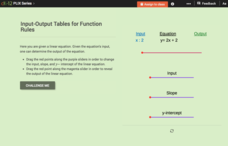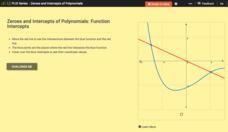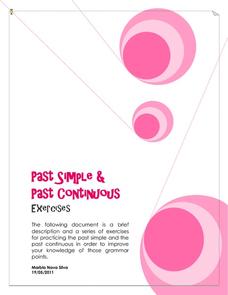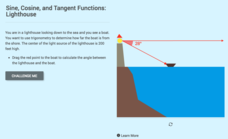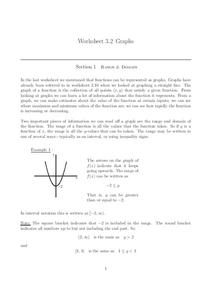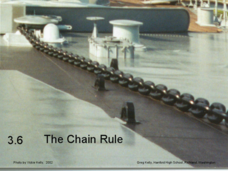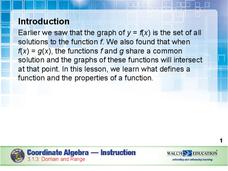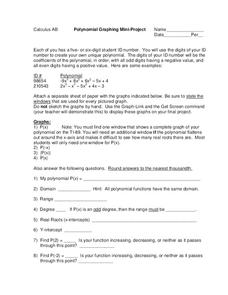CK-12 Foundation
Input-Output Tables for Function Rules
Make the abstract a bit more concrete with an interactive that asks learners to slide an input value through a function to determine the output. Changing the slope and y-intercept allows them to see the how the output values change.
CK-12 Foundation
Zeroes and Intercepts of Polynomials: Function Intercepts
There is zero reason not to use the resource. Given a graph with a polynomial function and a linear function, scholars move the line in an interactive. To wrap up the lesson, they note how zeros and intersection points change.
K20 LEARN
Transformers Part 1 - Absolute Value and Quadratic Functions: Function Transformations
Transform your instruction with an exploratory lesson! Young scholars manipulate absolute values and quadratic functions to look for transformation patterns. They use the patterns to write general rules of transformations.
Flipped Math
Unit 2 Review: Polynomial Functions
Wrap it all up in a box. Pupils review the key concepts from an Algebra 2 polynomial functions unit by working 19 problems. Problems range from using the Remainder Theorem to find remainders and finding factors; sketching graphs by...
Curated OER
Past Simple & Past Continuous
What is the difference between the simple past tense and the past continuous? Help your pupils master these tenses with the information and six grammar exercises included here.
CK-12 Foundation
Basic Inverse Trigonometric Functions: Ladder
Lean a ladder against the wall to create an angle. Class members use an interactive application to determine the angle a ladder makes with the ground. Individuals respond to five questions using inverse trigonometric functions.
CK-12 Foundation
Sine, Cosine, and Tangent Functions: Lighthouse
How far is that boat from the lighthouse? Scholars create diagrams to represent a scenario given the angle of depreciation from a lighthouse to a boat. Learners apply the basic trigonometric functions to find various distances...
Science Matters
Formative Assessment #1: Structure/Function
Just because you taught it doesn't mean they learned it! Use a quick formative assessment to check for understanding and ensure all individuals understand the role of structure and function. The lesson is the fourth in a larger series on...
Curated OER
Graphs
In this graphs worksheet, students solve and complete 15 various types of problems. First, they determine the range of the function of the graph shown and write in interval notation. Then, students find the domain of the function in the...
Curated OER
Calculus 3.6 - The Chain Rule
Greg Kelly puts together another great slide presentation to demonstrate ways to combine derivative rules to evaluate more complicated functions. This pattern is called the chain rule. He shows step by step ways to solve these...
Curated OER
Is There a Limit to Which Side You Can Take?
Calculus learners find the limit of piecewise functions at a value. They find the limit of piecewise functions as x approaches a given value. They find the limit of linear, quadratic, exponential, and trigonometric piecewise functions.
Texas Instruments
Is It or Isn't It Proportional
How can you tell if number relationships are proportional? Mathematicians investigate proportional relationships. They compare and contrast functions and graphs to determine the characteristics of proportional relationships, as well as...
Curated OER
Chemistry of Carbon - Building Blocks of Life
A great review of the structure and function of carbon-based molecules important to life, especially with relevance to humans. The chemistry behind the combination of polymers and the breakdown of bonds is covered. Valuable content...
Houghton Mifflin Harcourt
Graphs from Patterns
Fifth graders analyze patterns and begin looking at function tables. This is a pertinent preparation for graphing patterns. In fact, consider giving your class a piece of graph paper and then teach them how!
Curated OER
Making Money and Spreading the Flu!
Paper folding, flu spreading in a school, bacteria growth, and continuously compounded interest all provide excellent models to study exponential functions. This is a comprehensive resource that looks at many different aspects of...
Curated OER
Murder in the First Degree - The Death of Mr. Spud
Secondary learners investigate exponential functions in a real-world scenario. They collect data on the temperature of a cooling baked potato, enter the data into lists, and graph the data using a scatter plot before finding an...
Concord Consortium
Betweenness II
Read between the curves ... quadratic curves! Young scholars analyze the graphs of two quadratic functions by writing their own function whose outputs are between the two given. They then consider intersecting quadratic functions and...
Curated OER
Domain and Range
Relations, and functions, and line tests, oh my! An instructional slideshow demonstrates the definitions of a relation, a function, and the domain and range of a relation. Viewers then learn how to use mappings and vertical...
EngageNY
Why Call It Tangent?
Discover the relationship between tangent lines and the tangent function. Class members develop the idea of the tangent function using the unit circle. They create tables of values and explore the domain, range, and end behavior of...
Illustrative Mathematics
Foxes and Rabbits 2
The fox population chases the rabbit population. Groups model the populations of foxes and rabbits with two trigonometric functions. Individuals graph both trigonometric models on the same graph, and then teams determine an explanation...
EngageNY
Comparing Linear and Exponential Models Again
Making connections between a function, table, graph, and context is an essential skill in mathematics. Focused on comparing linear and exponential relationships in all these aspects, this resource equips pupils to recognize and interpret...
Shodor Education Foundation
Vertical Line Test
Connect the points to create a function. Using points given by the applet, pupils try to connect them to create a line that would pass the vertical line test. The resource keeps track of the number of sets the learner is able to identify...
Concord Consortium
Intersections I
One, two, or zero solutions—quadratic systems have a variety of solution possibilities. Using the parent function and the standard form of the function, learners describe the values of a, b, and c that produce each solution type. They...
Houston Area Calculus Teachers
Polynomial Graphing
Your AP Calculus learners probably have their ID numbers memorized, but have they tried graphing them? Pique your pupils' interest by asking each to create a unique polynomial function based on their ID numbers, and then analyze the...
Other popular searches
- Math Functions
- Quadratic Functions
- Exponential Functions
- Linear Functions
- Rational Functions
- Parent Functions
- Trigonometric Functions
- Inverse Functions
- Eye Functions
- Composite Functions
- Cell Organelles Functions
- Trigonometry Functions
